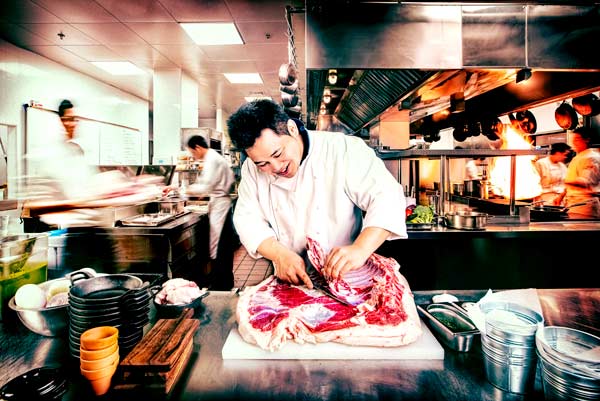Pride of place
 |
|
After working in some of New York's finest kitchens, Austin Hu returns to Shanghai. Rather than trying to go international or fusion, the commitment Hu has made is to source local produce and cook locally. [Photo provided to China Daily] |
And there is the purely white-looking spaghetti that has calamari and wild rice stems that taste like mushrooms and eggplant, called jiaobai in Chinese. The stems offer an "aha" surprise for domestic diners and "teaches a biological lesson" to foreigners about the endemic plant.
Hu's way of guaranteeing his ingredients' sources are "safe and sound" is simple - perhaps primitive. He and his team of 45 staffers try to meet as many farmers as possible, talk to people "who feel the same way I feel about food" and taste everything that comes into his kitchen.
"Faith (is) the staple" of his kitchen, he says. "This is a problem every single country has in the world," he explains.
"Actually, every industry in the world has its own problem, no matter what. But the answer that 'we are going to completely throw away Chinese ingredients and use imported ones only' is a very nearsighted and short-term one.
"As a food provider, part of our responsibility is to the food system, and we should try to change the food system somehow. It takes time. China has made incredible progress, but it has growing pains."
Cooking locally comes with a price - a much higher one than expected - since people generally believe grown-in-China products should be cheaper than imports.
The clientele of the restaurant with an average cost per head of about 200 to 300 yuan ($33-50) is half local and half foreign. Hu admits that at first some of the diners would sniff and leave the restaurant after learning they were paying "that much for local products".
But Hu has set his mind on proving them wrong. And the result is rewarding. Business has been growing annually, despite frustrating moments and misunderstandings from guests who think he uses local produce to lower the cost.
"I am huaqiao (overseas Chinese) and Chinese by descent. These are my people. I am here because I believe in the potential of what China can be in 20 years' time. If I can be a small part of what that future can be - somehow a footnote of that history - I think I have done my job," Hu says.
"Our day-to-day business is making food for people and making a living ourselves. But on a long time scale, we are looking for what we can contribute to make the world a better place."
















